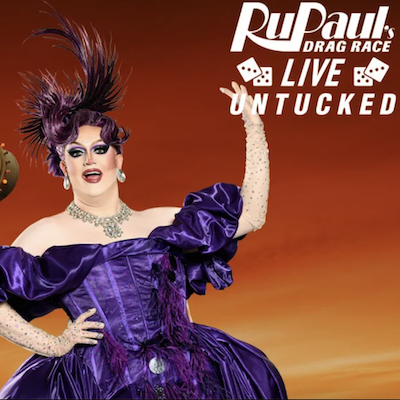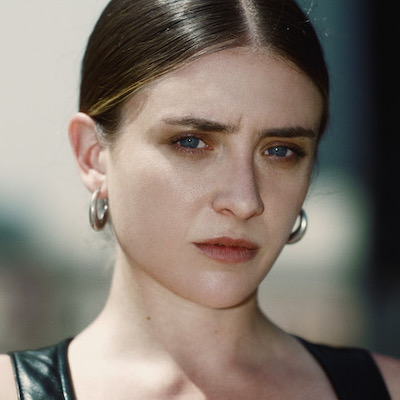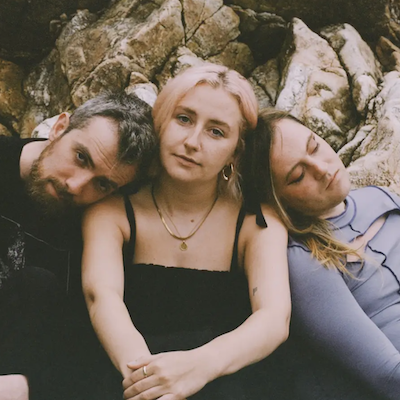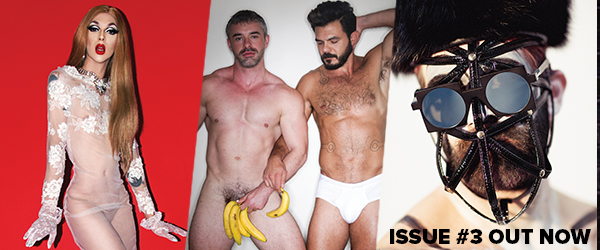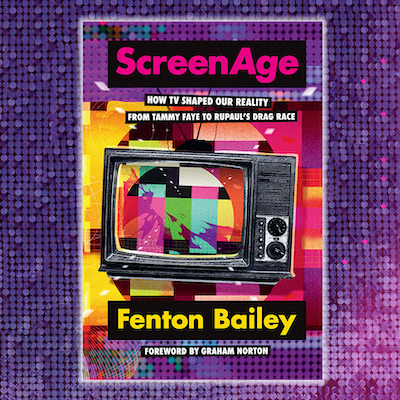
Fenton Bailey is co-founder of World of Wonder Productions, the legendary platform that has blessed us with the greatest television show on Earth – RuPaul’s Drag Race. Not only that but WOW is behind essential documentaries on LGBT icons like Robert Mapplethorpe & Big Freeda and films such as Party Monster.
Fenton also recently released the book ScreenAge: How TV Shaped Our Reality, From Tammy Faye to RuPaul’s Drag Race which takes a look at the impact of the small screen, specifically reality television, on all our lives. To celebrate LGBT History Month, Loverboy caught up with Fenton to discuss his gay icons, important LGBT moments from history and ageism on television.
Hi Fenton, congratulations on the wonderful ScreenAge. Who did you most look forward to shining a light on when approaching the book?
It’s really all about the big impact of the small screen. Only recently has television enjoyed respect as a medium and to this day the most praise is reserved for the premium scripted stuff. But I think the least respected genres of this least respected medium – specifically unscripted, reality, and commercials – have had the most cultural impact and are therefore the most important.
Was there anything you had forgotten about but were reminded of when writing ScreenAge?
Yes. How it was basically illegal to be gay and – connected with that – a feeling of anxiety and hopelessness about what I was going to do with my life and what would become of me. Especially on a Sunday. I left England to forget all that and until writing the book pretended that I had.
Being a Brit who lives abroad – what have you enjoyed teaching Americans about?
To be honest I’m the one who has been schooled! I went to America with a grab bag of prejudices – like how could anyone say ‘Have a nice day’ and really mean it – and a very British sense of superiority. But I also went to America because I craved freedom – from the class system especially. And it gave me everything I could have wanted and so much more. Like, for example, what to do on Sundays.
I don’t know if you can answer this but hypothetically speaking, if you were to choose one moment from the screen for a Lip Sync For Your Life á la Designing Women, who would you like to see?
I do love a spoken word lip sync and Lypsinka’s unforgettable cut-up telephone montage has always been an inspiration. I mean you can really lip sync anything. Randy and I always loved it when Ru would lip sync Champale commercials. Champale is – or was – a really undrinkable beverage on the market that mixed beer and champagne.
This month is LGBT History Month – away from the screen, who were the important LGBT people in your life growing up? I think I had a couple but I was pretty hostile to them because I was in the closet and gay shame etc…
I hear you on the gay shame thing. There were camp comedians, but it was all so unspoken. Kenneth Williams. John Inman. Mrs Slocombe’s Pussy. So as a young boy it was confusing. I really had no idea what was going on. I had no idea that Elton John was gay. But I liked him. I had no idea that Batman the TV show was camp as tits. But I liked it. I also liked Oscar Wilde. Noel Coward. My first gay icon was David Bowie – even though he turned out not to be gay – so the confusion continued. I think the thing that shook me the most was seeing Tim Curry in The Rocky Horror Picture Show. It was a crazy-ass romp. There was something so voluptuous, decadent and wicked about it even though – both absurdly and brilliantly – he was named after a sausage (Frank N Furter).
The history of AIDS will forever be a huge part of Queer history but it seems to have been a hotter topic than ever in recent LGBT shows. At 42, I think It’s a great thing but I need happy storylines in equal balance. How do you feel about the amount of AIDS coverage onscreen recently?
I first heard about AIDS – or GRID as it was known – a couple of weeks before moving to the States in the Fall of 82. As a young student I was terrified. The toll of AIDS on the downtown community was swift and terrifying. Scores of talented artists died so young. At the same time there was a defiant energy, a desire to make something out of nothing, and in doing so stare down all this death and suffering. I feel that that story has not been told and needs to be told. I was so frustrated that when it came to telling the story of Wojnarowicz we were unable to get any funding. Not a single penny. Yet here was someone whose reaction to the death sentence of his diagnosis was an incandescent rage and outpouring of work. There was nothing maudlin or sentimental about it – perhaps that’s what put people off?
Which other events in LGBT history would you like to be covered in storylines onscreen?
Following on from the last question I think when you put gays under pressure, Camp is the result. I want to see more stories in which rage becomes alchemically transformed into this twisted beautiful thing. Camp has been misapprehended as a niche sensibility, when it is actually a powerful moral force, a weapon. I think too many gay stories go untold because people think “Oh that’s niche”. That was the challenge with Drag Race initially and, as we roll the format out internationally, it still is the challenge in some countries. People do not see that we are all in drag, and that LGBTQ+ stories aren’t niche – they are universal.
Reddit seems obsessed with who will replace Ru – as if to say she is too old. Truly crazy. How do you feel about representation of older queer folk on TV?
We’re here, we’re queer and we’re getting older by the day. And whether you choose to age gracefully or disgracefully, it’s all drag at the end of the day -whether you go under the knife or pluck your eyebrows.
And youth may be overrated: You may be able to do a jaw-dropping deathdrop at nineteen, but you might not have anything to say.
In your opinion, how has ‘What it takes to be an LGBT icon onscreen’ changed over the years?
No not really. But we stand on the shoulders of others and – I speak for myself – far more courageous than I have ever been.
Lastly, we are named after the biggest selling single of 2001 and so always ask what is your favourite Mariah song?
‘All I want for Christmas is you.’
Bonus Question. Michelle has already famously said, ‘Mariah Carey isn’t funny.’ Sacrilege! Haha…would you like to see her as a judge on the show? Could you imagine this happening?
Never say never.
ScreenAge: How TV Shaped Our Reality, From Tammy Faye to RuPaul’s Drag Race by Fenton is published by Ebury Press and is available in all good bookstores now. Order now at https://smarturl.it/ScreenAge.
Season 15 of RuPaul’s Drag Race is currently available exclusively in the UK via the streamer of all things drag, WOW Presents Plus, with new episodes dropping on Saturdays at 2AM GMT. Subscribe at https://uk.wowpresentsplus.com/.



